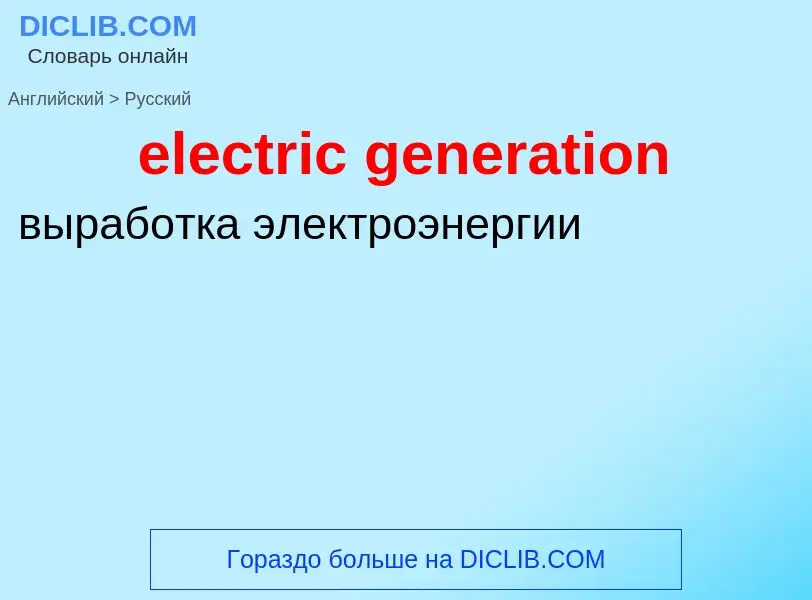Traduction et analyse des mots par intelligence artificielle
Sur cette page, vous pouvez obtenir une analyse détaillée d'un mot ou d'une phrase, réalisée à l'aide de la meilleure technologie d'intelligence artificielle à ce jour:
- comment le mot est utilisé
- fréquence d'utilisation
- il est utilisé plus souvent dans le discours oral ou écrit
- options de traduction de mots
- exemples d'utilisation (plusieurs phrases avec traduction)
- étymologie
electric generation - traduction vers russe
Définition
Wikipédia

Electricity generation is the process of generating electric power from sources of primary energy. For utilities in the electric power industry, it is the stage prior to its delivery (transmission, distribution, etc.) to end users or its storage (using, for example, the pumped-storage method).
Electricity is not freely available in nature, so it must be "produced" (that is, transforming other forms of energy to electricity). Production is carried out in power stations (also called "power plants"). Electricity is most often generated at a power plant by electromechanical generators, primarily driven by heat engines fueled by combustion or nuclear fission but also by other means such as the kinetic energy of flowing water and wind. Other energy sources include solar photovoltaics and geothermal power. There are also exotic and speculative methods to recover energy, such as proposed fusion reactor designs which aim to directly extract energy from intense magnetic fields generated by fast-moving charged particles generated by the fusion reaction (see magnetohydrodynamics).
Phasing out coal-fired power stations and eventually gas-fired power stations, or, if practical, capturing their greenhouse gas emissions, is an important part of the energy transformation required to limit climate change. Vastly more solar power and wind power is forecast to be required, with electricity demand increasing strongly with further electrification of transport, homes and industry.




![GW]]. GW]].](https://commons.wikimedia.org/wiki/Special:FilePath/Hoover dam from air.jpg?width=200)
![[[Wind turbine]]s usually provide electrical generation in conjunction with other methods of producing power. [[Wind turbine]]s usually provide electrical generation in conjunction with other methods of producing power.](https://commons.wikimedia.org/wiki/Special:FilePath/Turbine aalborg.jpg?width=200)

.png?width=200)
![French [[poilu]]s on a battlefield during the First World War French [[poilu]]s on a battlefield during the First World War](https://commons.wikimedia.org/wiki/Special:FilePath/French trench battle.jpg?width=200)
![Jack]] in 1924. Stein is credited with bringing the term "Lost Generation" into use. Jack]] in 1924. Stein is credited with bringing the term "Lost Generation" into use.](https://commons.wikimedia.org/wiki/Special:FilePath/GertrudeStein JackHemingway Paris.jpg?width=200)

![Vitagraph]] film, 1912) Vitagraph]] film, 1912)](https://commons.wikimedia.org/wiki/Special:FilePath/Scene from 'Lady of the Lake' (Vitagraph film), 1912.jpg?width=200)

![Family in [[Queensland]] pictured at home (circa 1900) Family in [[Queensland]] pictured at home (circa 1900)](https://commons.wikimedia.org/wiki/Special:FilePath/StateLibQld 1 169147 Andersen family photographed in their living room at Swanfels, Queensland, ca. 1900.jpg?width=200)

![[[Typewriter]]s entered common use as a writing tool for the Lost Generation [[Typewriter]]s entered common use as a writing tool for the Lost Generation](https://commons.wikimedia.org/wiki/Special:FilePath/Underwoodfive.jpg?width=200)
![A young woman burning a cable for scrap at a shipbuilding yard in [[Glasgow]] during World War I. A young woman burning a cable for scrap at a shipbuilding yard in [[Glasgow]] during World War I.](https://commons.wikimedia.org/wiki/Special:FilePath/Women in the First World War Q110080.jpg?width=200)
